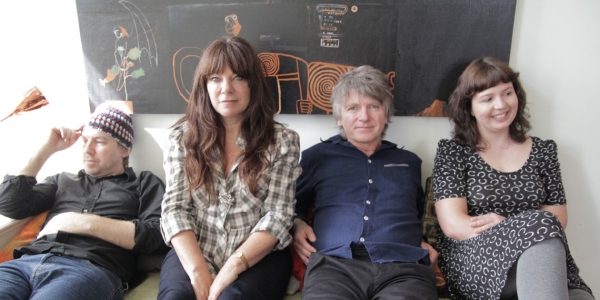It’s an avowal that may very well surmise The Vines’ philosophy to date. Instilled with the virtues of the past, The Vines’ characteristic fusion of garage-punk, psychedelia, classic pop and grunge is both a response to their contempt for modernity’s trappings and a visceral combustion of their fearless resolve to do what they want.
Since the release of The Vines’ influential debut album, Nicholls has remained one of rock’s most fascinating individuals. But it was a personality that quickly became a media construct due to various controversies and volatile moments. In late 2004, that all changed when word spread that Nicholls had been diagnosed with Asperger’s syndrome. But more importantly, the news shone a light on the dangers of society’s hasty assumptions, judgements and insensitivity. After all, kicking a photographer’s camera and smashing a journalist’s tape recorder can be more aptly explained as rock star antics than the volatile effects of mental illness, right?
Speaking to Nicholls on the eve of their fifth album’s release, the singer-songwriter/lead guitarist is in a relaxed – even jovial – state. Besides the release of The Vines’ new album Future Primitive, Nicholls appears to be in a good place, health-wise and personally. “Yeah, I feel really good; really happy to be having shows coming up,” he attests. “I’m proud of this latest album.”
It didn’t seem that way in late 2008, though, when The Vines were forced to cancel a number of festival performances. “I think I just went a bit crazy and I just wasn’t sure what was going on,” recalls Nicholls.
“We needed to stop for a while. I just wasn’t really functioning that well, so I thought we better have a break.”
In 2011, the 33-year-old is a more mature, polite and affable individual, who’s dealing well with his Asperger’s. He emphasises, however, that the journey would have been impossible without his supportive family. “My family help me out however they can, so that’s been good,” he avows.
“I don’t take any medication and I don’t speak to [specialists] about it (since the initial six months of therapy, which brought upon a previously unthinkable halt to his marijuana addiction). It’s been okay so far… hopefully we can have things planned out, so that we can manage everything.”
Of course, Nicholls’ bandmates – Hamish Rosser (drums), Ryan Griffiths (guitar) and Brad Heald (bass) – have assisted him throughout his personal and emotional challenges. “They’re very good with it – they let me be myself,” he admits. Moreover, concentrating on his songwriting has been key to staying on track for Nicholls, as well as ensuring that everything is organised so as to lessen stress.
When The Vines closed their solid Big Day Out set this year with Get Free, it invoked some of the passion and conviction that first captivated the masses in 2002. Nicholls states that the invigoration of that live performance was boosted by their enjoyment of Future Primitive’s creative process.
In the album’s title track, Nicholls sings the pertinent lyric: “I’m a future primitive / I’m a new definitive with no reason why / Come and find me before I go”. “We wrote that one pretty early on,” Nicholls recalls. “We had a bunch of songs – I wrote 40 all together, so we just chose what we thought were the best ones. I listened to a lot of bands from the ’90s like Supergrass, Blur and Suede… Super Furry Animals as well.”
Future Primitive also saw The Vines working with a new producer in Chris Colonna (Bumblebeez, Wolf & Cub). American producer/musician Rob Schnapf (Elliott Smith, Dr. Dog, Powderfinger) had produced Highly Evolved, Winning Days (2004) and Melodia (2008) while legendary Australian producer Wayne Connolly took over on Vision Valley (2006). Future Primitive was also mixed in Paris by Julien Delfaud (Phoenix) – with assistance from Philippe Zdar – via phone calls and CD mailings. “Our manager knew Chris and had suggested doing some demos with him,” Nicholls explains, “so we did that and just got along really well.
“He had a lot of different effects pedals and cool ways of working, so we decided that we’d do the whole album with him. We’re all friends with him now, so it was really fun.
“I’d written Future Primitive (the title track) and we demoed it with Chris – when I was explaining what we wanted to do [with the song], he was going ‘oh, that’s the title of the album!’”
Laying down the rhythm tracks, says Nicholls, was the most thrilling aspect of their fifth album’s recording process. “We did them live and very quickly,” he relates. “We got them in a few takes and did all the drums, guitars and bass at the same time.” But the most unique and intriguing tracks on Future Primitive would have to be All That You Do and Outro.
“With All That You Do, I was just on my own and – without sounding too corny – when I did the demo, it sounded very spiritual, like a hymn,” says Nicholls. “And then, in the studio, it worked out really cool; we kind of added a drum machine at the end and we never really use a drum machine – we used it on the title track but that’s with a real drum kit as well mixed in.
“Outro was just wanting to do something really abstract with no real structure to it – just a lot of soundscape; I really like that one a lot.”
Nicholls’ deeply ingrained love of the untouchable era of ’60s pop music and the cathartic explosiveness of alternative rock in the ’90s can be attributed to his abhorrence of songs being clouded or overtly affected by technology. “I think it’s just the ideas and songs that have always really interested me, so it’s just always been that,” he ascertains.
“I think it’s important for bands to do their own music – to get people thinking about their ideas and that’s what’s appealing about it… that it’s got an individual thing going on. There’s a lot of great technology now that doesn’t necessarily inspire me, but then I like Gorillaz… as long as it’s creative and it’s always coming from that kind of place… it’s about music and it’s about ideas as opposed to just money-making.”
It leads to a reflection on what it is that drives him. “I just like writing songs and making demos… I don’t really do much else; it’s just music,” says Nicholls. “I’m always working on songs – it’s just an interesting call to me. I like playing the guitar, but I play guitar so I can write songs and make albums.”
Receiving the high accolade of being the first Australian band to grace American Rolling Stone magazine (October 2002 issue) since Men At Work in 1983 means more to Nicholls now than it did back then. “It’s a great thing that we did something like that because it is a big deal,” he reflects.
“At the time, a lot of crazy things were going on and we were very busy – I don’t think I really thought about how much a big deal it was. But now looking back at it, it’s definitely a big deal and something that I’m really proud of.”
Flying to Los Angeles to record Highly Evolved in July of 2001 had been more than an artistic journey. “Going to America for the first time really made me see things differently, because before we recorded our first album, I had never left the country,” states Nicholls. “So going there and then going to Europe, it was just cool to see some different places and then going to England and getting a really good response there was really great.”
They hope to rekindle that strong response garnered by their first two albums when they return to Europe and America after their Australian tour. Following their performance at Splendour In The Grass, The Vines’ Australian tour for Future Primitive will run across late August and early September, with the Melbourne launch staged at The Hi-Fi on September 3.
Speaking of All That You Do’s spiritual tone – while it’s not uncommon to see Nicholls’ guitar in a myriad of pieces after shows, how often does being on stage become a spiritual experience? “I guess it doesn’t happen all the time, but there’s definitely moments when everything comes together and you can sing very clearly… and everything is coming through and you feel like the audience is getting it,” he ponders.
“I don’t know when those moments exactly happen, but they’re in there somewhere….”







